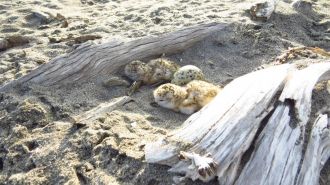 The unlawful removal of a large information sign installed on Ōhope Spit recently has caused significant concern for Whakatāne District Council and Department of Conservation (DOC) staff.
The unlawful removal of a large information sign installed on Ōhope Spit recently has caused significant concern for Whakatāne District Council and Department of Conservation (DOC) staff.
The sign provides information on the Council’s Beaches Bylaw, which came into effect midway through 2018. The bylaw allows quad bike access to a part of Ōhope Beach for recreational fishing, but also established a new restricted area between Maraetōtara Reserve and the boundary with the Ōhope International Golf Course. Alongside this, all vehicle, horse and dog access has been prohibited to the beach east of the golf course, around to the eastern end of the Port Ōhope Recreational Reserve (Boat Ramp) area.
Council Manager Places and Open Spaces Manager Mike Houghton says the bylaw aims to create a balance between recreational activities and the need to protect fragile shorebird habitats. "Threatened NZ Dotterel nest close to the high tide mark on a number of District beaches, from September through to March, and Ōhope Spit is known to be an important nesting area," he explains. "The bylaw changes were strongly supported by DOC, the Bay of Plenty Regional Council, local Iwi, and Forest and Bird, to prevent damage to nesting areas and the adjacent dune structures.
"Sadly, many reports of vehicles and dogs accessing the fragile dune and beach areas have been received since the bylaw came into effect, despite obvious signage along Ocean Road, at key boat ramp/vehicle access areas, and two large signs on the beach where the restrictions start. One offender has been fined for taking both his vehicle and dog into the restricted area, thanks to the vigilance of a local beach-goer."
Department of Conservation Ranger Mithuna Sothieson reiterates the importance of the area for threatened shorebirds and encourages the public to respect our special local wildlife. "DOC has the ability to undertake enforcement under the Wildlife Act, but this relies on someone witnessing direct harassment, injury or death of protected wildlife," she says. "There are significant consequences for offending, but we hope people can just be respectful of these rules, which are there to provide balance."
Mr Houghton says the stolen signs will be replaced, but this will be at an additional cost to local ratepayers. "We would like beach users to be aware of and comply with the new bylaw, so that beaches can be used without impacting on our fragile ecosystems," he says. "We're very lucky to have such an extensive coastline, so there is plenty of room for all to enjoy."
Beaches Bylaw in brief (information pertains to Ōhope only):
- Quadbikes (only) are permitted on the beach east of Maraetōtara Reserve, to directly adjacent to the start of Ōhope International Golf Club - for recreational fishing activities only;
- Any vehicle accessing the beach must use formed vehicle accessways;
- No vehicle can access the dune areas and esplanade reserves above the high tide mark - at all times;
- Drivers and vehicles must be licenced and warranted and drive no faster than 20 kph;
- Vehicles other than quad bikes can access the beach at the three other designed vehicle accessways – at West End, Mair Street and Maraetōtara Reserves. These vehicles must drop boats/gear etc. then immediately leave the beach to park in car parking areas;
- No vehicles, horses or dogs are permitted on the beach from the boundary of the golf course, eastwards around the spit and through to the eastern boundary of the Port Ōhope Recreational Reserve (Boat Ramp).
The Council is keen to hear of any breaches of the bylaw, and if there is sufficient evidence, will seek to charge the individuals responsible. Members of the public who see vehicles, dogs or horses at the spit are encouraged to note vehicle registration numbers and/or take images on their mobile phones, if they feel safe doing so. Offences can be reported to the Council at any time by ringing 07 306 0500; while traffic offences can be reported to the Police on *555 or 111. If wildlife is threatened, contact the Department of Conservation on 0800 DOC HOT.
Visit the Bylaws page for more information regarding the full beaches bylaw.